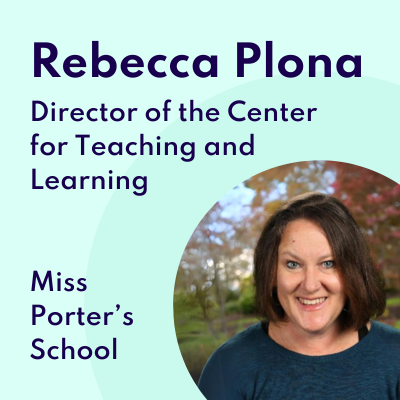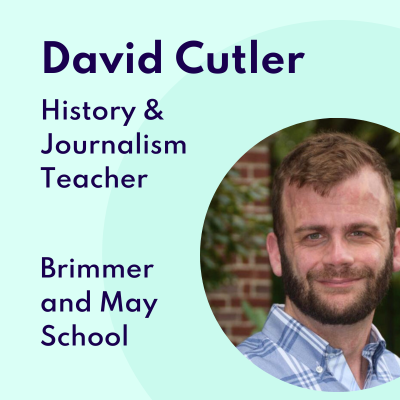Education proclaims noble aspirations that independent schools tend to characterize in values language: equity, community, inclusion, and justice, and I believe that most educators are very sincerely committed to these values. Alas, however, we have inherited a system in which rankings, ratings, scores, honors, and awards are endemic and where their presence in a school’s practice is often a signal that the school values “rigor.” Some believe that these recognitions are motivating to students.
And we record these plaudits and include them on things like applications and transcripts, creating distinctions when, say, two students from one school are applying to the same college or next school. One has the little award notation, and one does not. Even if the reader has no idea what the award actually represents, it will likely shine like a little gold star on the record and have its influence. Each of the brick-and-mortar schools where I worked distributed awards on one fine day just before graduation. Some of these awards were obvious in their intent and purpose, but many—the Class of 1897 Character Award or the Algernon Percival IV Award or the Ivy League Book Award—were mainly, it would seem, more intended to honor the original donor or someone from the distant past than to encapsulate some meaningful value, even if the citation read at the ceremony was laced with value-laden words. In the last of these schools, we saw and felt the disconnect and took to heart the disappointment of students. A look into award-winner demographics over a few years demonstrated that the school’s strategic priorities around equity and inclusion were not playing out in the distribution of awards, including the “honor society” to which the school belonged and to which the school could only admit a defined percentage of students in each class. Something needed to be done to try to bring what we did into alignment with what we said. A small committee was formed—diverse in all possible ways including experience level—and we began to do research and brainstorm ideas. It was clear that the awards concept was too deeply embedded in the school’s traditions and culture to be eliminated entirely. We started with a confidential survey to students, asking 1) what students thought about the scope and perceived purpose of existing awards (“Meh”), 2) whether students thought these awards had any relation to the school’s values (“Maybe some”), and 3) whether students found them motivating (“A hard NO”). We even asked which awards should be scrapped or added. We listened. First to go were the college-named book awards. These were, it seemed, not only just rather fluffy but had been instigated as product placements for the colleges. And they confused people: If you won the Ivy League Book Award as a sophomore, doesn’t that mean that you will automatically get into Ivy League, maybe with a scholarship? Well, no. Fare thee well. In the end most of the old awards regime was tossed and three new “major” awards were instituted at each upper school grade level. The first was for “students who have contributed in positive ways to life at [the school]” and have “shared the gift of their own passions and values” and “demonstrated a consistent willingness to take responsibility for enhancing the quality and meaning of membership in the school community.” The second recognized students “who have demonstrated outstanding intellectual curiosity and engagement … and a deep respect for the collaborative and communal nature of learning. These students have shown exemplary quality in their own work and exemplary spirit and values as members of a learning community.” The third was awarded to “students whose efforts in all areas of academic life have been exemplary” and “have demonstrated their understanding of the principle that education is an endeavor worthy of sustained commitment.” Service to the school community, academic achievement, and hard work—these mirrored what both students and faculty had identified as meritorious, and they echoed both the school’s mission and its venerable motto. No handcuffing criteria, and awards at each level were to be discussed and voted on by all the teachers involved with that grade. Multiple winners were welcome. The school also made a point, when the honor society inductions were announced, to include a somewhat lengthy (and possibly tedious) definition of the society’s published criteria for selection. Whether the school would remain a part of the society was an open topic. And the awards concept in general remains an active conversation—along with things like traditional grades. The unexamined award, we determined, is very definitely not worth giving. A final note. One year at the awards ceremony the student council president rose to announce the initiation of a council-voted award for a teacher. The first recipient was to be the teacher for whom the award would be forever named. The mortified teacher, taking the engraved silver bowl, mumbled, “I really should be dead before this kind of thing happens,” and remained embarrassed throughout their career whenever the annual winner was announced. Sometimes winning can be as difficult as being lumped among those who did not win. And consider this: If only winners are named, is it so strange that some who are not named might feel a bit like losers? Is that what we want?
0 Comments
I applied this approach unthinkingly, and I did so for many years. The policy was clear-cut and seemingly fair. I had no idea how detrimental the policy was to my most vulnerable learners.
Punitive late work policies have little impact on high performing students. Those students, likely motivated by a fear of low grades and/ or a desire to please their teacher, rarely miss deadlines. Indeed, their lateness occurs so infrequently that it is often excused as an aberration. Struggling students, however, turn work in late for any number of myriad reasons. Lower performing students learn from an early age that their efforts and contributions are valued less than other high performing students. And students who grow up seeing that their work is worth less are at risk of eventually believing that their work is worthless. My current late-work policy is simple: students can earn up to a proficient grade (B range) for any work submitted late. This policy is anchored in the premise that it’s my responsibility to cultivate learners, and that the purpose of assessments is to give feedback that helps students achieve a proficient standard of learning. Proficient B’s are the mid-range grade for students aspiring to college: a B is less than an exemplary A, but it’s more valuable than the less sufficient C. This approach trains students for college and beyond by reinforcing the fact that submitting work late isn’t exemplary, and that such habits do have consequences. But it also communicates to students that their work is worthwhile, and that they are worthy of whatever support I can provide to help them achieve a proficient level of learning.
Those of us who have been teaching for many years know that even with late penalties, we still consistently receive late work from a subset of our students each term. If our goal is to build student capacity in this area, a consequence or a punishment is not necessarily what will help them as they work to build new habits. Is there a way to address late work that could be more effective at building the underlying skills to prevent lateness in the future?
In my classes, there's a process. Students must communicate at least 24 hours in advance of the deadline to request a 24 hour extension. I tell them at the beginning of the course that they may have one extension “free of charge” - they don't need to create the perfect excuse, but may just let me know that they need a little more time. If however, they require a second extension or time beyond 24 hours, they must sit down with me for a face to face conversation and we’ll create a plan for overcoming whatever obstacle they’ve encountered. It might include an assigned study hall, or a meeting with the writing studio, or maybe just helping them look at their schedule for the next few days and create a little more balance. It’s an opportunity to open a dialogue, and learn more about that student and what they’re juggling in their lives. Whatever the reason for the extension, it's clear to me that a second request indicates a student who could use some targeted support in navigating deadlines. What this approach does is twofold. Knowing that one extension will be granted without any need for evidence or conversation gives students permission to be human. In a world where we expect perfection from young people in so many areas of their life, the simple grace of allowing an assignment a little bit more time to come in lets students be people. The subsequent conversation, if necessary, lets us surface the reason for the late work. Does the student need help with the assignment? Structure in their work time? Guidance in navigating multiple priorities? A more personalized approach to late work centers the student and their process, and creates even more opportunities for growth.
One of the primary elements of a successful high school student is a growing sense of responsibility. However, even if a school’s mission supports this endeavor, involving high school students in disciplinary committee decisions is not the most effective or fair approach to gaining additional experience and responsibility. In addition to developing their understanding of multifaceted issues and social dynamics, high schoolers are learning where they stand in every ethical dilemma they face. Coupled with the scientific fact that their brains are still building some of the key ingredients to make complex decisions, they are constantly confronted with situations where they are pulled in many directions and feel conflicted when they make one decision or another. Disciplinary decisions often involve complex situations that demand an experienced and mature perspective. Professionals and educators are much more equipped to maneuver through these intricacies so that a fair outcome is achieved. Most teens are innately connected to their peer groups and involving them in decisions that impact their friends or peers may lead to partiality or perception of bias, therefore altering the integrity of the disciplinary process and even the overall learning environment. High schoolers are often challenged by remaining impartial which is heightened by the additional factors of social media and other pressures. Asking a teenager to make a decision about someone their age that might alter their social or academic life forever might place an undue burden on them as well. There are so many academic and personal challenges that teens already have to face so why add the weight of making an additional decision that could affect their well-being? An alternative for DC participation is having students create an advisory board for how DC decisions are made or how to enhance the disciplinary experience so it is the fairest, most effective, and most just for each student who faces it. Responsibility and accountability are essential in a student’s high school education, however, involving them in DC decisions is not beneficial for them or any school's disciplinary process. Works Cited
Petrie, Sandra, et al. “The importance of peer group (“crowd”) affiliation in adolescence.” Wiley Online Library, vol. 9, no. 1, 1986, pp. 73-96, https://onlinelibrary.wiley.com/doi/abs/10.1016/S0140-1971(86)80029-X. Accessed 12 November 2023. “Teen Brain: Behavior, Problem Solving, and Decision Making.” AACAP, https://www.aacap.org/AACAP/Families_and_Youth/Facts_for_Families/FFF-Guide/The-Teen-Brain-Behavior-Problem-Solving-and-Decision-Making-095.aspx. Accessed 12 November 2023. Empowering Student Voices: Brimmer and May’s Judicial Board Values Inclusivity and Democracy12/8/2023
My candidacy for the Board fell short, but I was honored to contribute to a democratic process. Including student representation in your school’s disciplinary and restorative justice practices can greatly enhance the fairness and effectiveness of these systems. |
Don't miss our weekly blog posts by joining our newsletter mailing list below:AuthorsBrad Rathgeber (he/him/his) Archives
July 2024
Categories |






 RSS Feed
RSS Feed